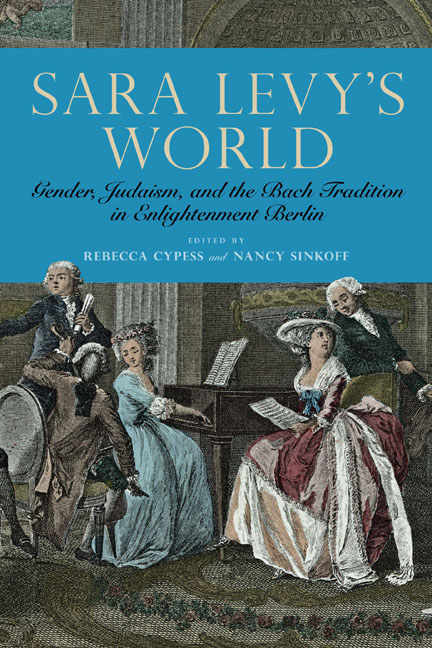Book contents
- Frontmatter
- Dedication
- Contents
- Acknowledgments
- Introduction: Experiencing Sara Levy’s World
- Part One Portrait of a Jewish Female Artist: Music, Identity, Image
- Part Two Music, Aesthetics, and Philosophy: Jews and Christians in Sara Levy’s World
- Part Three Studies in Sara Levy’s Collection
- Appendix: The Salonnière and the Diplomat: Letters from Sara Levy to Karl Gustav von Brinckmann
- Bibliography
- List of Contributors
- Index
2 - Sara Levy’s Musical Salon and Her Bach Collection
Published online by Cambridge University Press: 21 April 2021
- Frontmatter
- Dedication
- Contents
- Acknowledgments
- Introduction: Experiencing Sara Levy’s World
- Part One Portrait of a Jewish Female Artist: Music, Identity, Image
- Part Two Music, Aesthetics, and Philosophy: Jews and Christians in Sara Levy’s World
- Part Three Studies in Sara Levy’s Collection
- Appendix: The Salonnière and the Diplomat: Letters from Sara Levy to Karl Gustav von Brinckmann
- Bibliography
- List of Contributors
- Index
Summary
The Bach Family in the Musical Life of Eighteenth-Century Berlin
In a letter of January 9, 1742, to his cousin Johann Ernst Bach in Eisenach, Johann Sebastian Bach wrote that “now in Berlin a musical epoch has begun” (in Berlin ist ia nunmehro das musicalische seculum angegangen). This statement apparently reflects what he had observed and experienced the previous summer when visiting Berlin and his son Carl Philipp Emanuel, who in 1740 had been appointed harpsichordist of the Royal Prussian court Capelle. The musical atmosphere in the Prussian capital of the 1740s was being revitalized and indeed completely revamped by the young, powerful, and musically active King Friedrich II (“the Great”). In its broad spectrum, ranging from opera—with a brand-new opera house—to chamber music, there could be found no parallel elsewhere in Europe. Hence, the 57-year-old Bach seems to have been proud that his second son and a number of his former students were part of, and played important roles in, this remarkable scene.
Nobody could have foreseen, however, that the Seven Years’ War (1756–63) would soon change all this and bring the abounding musical life at the royal court to a near standstill. Nor could anyone have imagined that the sharply curtailed musical life would have the beneficial side effect of an unprecedented growth of musical activities outside the court proper, notably among the Berlin aristocracy and affluent bourgeois circles, a phenomenon prompted and aided by the availability of idle court musicians. Least of all could it have been anticipated that the later decades of the eighteenth century would establish Berlin as a major center for the performance and reception of music by the Bach family.
Berlin became the city where three of Johann Sebastian's sons would live and work, at least for certain periods: Carl Philipp Emanuel (1740–68), Johann Christian (1750–55) and Wilhelm Friedemann (1774–84). Even Johann Christoph Friedrich, concertmaster in Bückeburg, maintained regular connections in Berlin, since the principality of Schaumburg-Lippe was a kind of Prussian satellite state; his son Wilhelm Friedrich Ernst—the last musician in the family—was in 1789 appointed harpsichordist to Queen Friederike of Prussia and spent the bulk of his professional life in Berlin.
- Type
- Chapter
- Information
- Sara Levy's WorldGender, Judaism, and the Bach Tradition in Enlightenment Berlin, pp. 39 - 51Publisher: Boydell & BrewerPrint publication year: 2018
- 1
- Cited by



